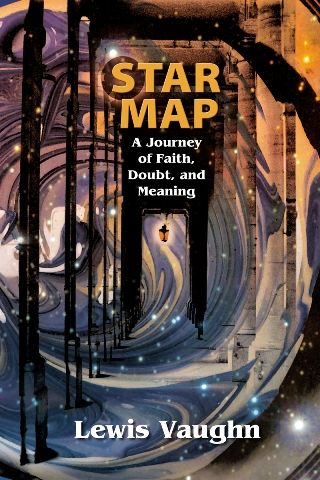Religion
Finding Meaning After Losing Faith
Raised in a strictly believing home, what's a young skeptic to do?
Posted May 2, 2017

It's been said that the journey is at least as important as reaching the goal. In a new memoir, Star Map: A Journey of Faith, Doubt, and Meaning (Freethought House) by Lewis Vaughn, it's true.
Vaughn, author of many books and textbooks, describes in his memoir how he slowly, painfully stopped believing what everyone around him believed. Fundamentalist Christians, they were all certain that questioning the Bible as literal truth was tantamount to sending your soul to hell.
Readers learn how Vaughn finally, in college, finds answers—of a sort—to the questions he's been wondering about his whole life. Not casually wondering about, but being driven half-mad by the lack of good answers to his most urgent questions about faith, God, and meaning. And from there, his life took a remarkably different turn. Here's my interview with him.
Q&A with Lewis Vaughn
Q: Lewis, you write beautifully, using novelistic techniques to keep us turning pages. In your Author's Note, you admit to using your imagination almost as much as your memory to reconstruct events and conversations from long ago. Can you add something to that?
When I began to write this memoir, I found that my memories had been dimmed not just by the years, but by my relentless attempts to suppress painful recollections. But I mined what I could and discovered that, although many of my retrieved memories came back pale and indistinct, the meaning of those memories was clear. My memory’s factual record was incomplete, but its underlying truths seemed to shine.
So with imagination, reflection, and shards of memory, I reconstructed some events and scenes, and the result, I think, is a story that tells more truth about me and my collision with religion than any bare account of the remembered facts could.
Q: For me, the value of Star Map is offering readers an in-depth look at how a particular kind of childhood in a particular kind of community has the power to inculcate even very smart young people, people whose native skepticism might have been able to overcome early religious indoctrination if only they'd been born elsewhere. One's philosophy and ethics, then, have a lot to do with one's exposure to diverse ways of thinking. Thus, your life story taught me something about those who believe what you used to believe. Comments?
Undoing religious indoctrination of any kind is extremely difficult, mainly because faith and dogma inoculate strong beliefs against reasonable skepticism and commonsense realism. Faith and dogma, by definition, are not supposed to be responsive to evidence and argument. Yet like me, for a variety of reasons, many true believers do manage to break their chains and see the world from a different perspective.
This transformation can begin in many ways (as the formerly religious can attest), but one common element is a moment of skeptical questioning—the very thing that religions warn against. For many believers, their best hope of breaking free is found in allowing that seed of skepticism to grow.

Q: Do you think that others who were raised like you were might be able to learn some healthy skepticism from knowing your story?
I do think my story and many others like it can teach commonsense skepticism. Like most deeply religious people, I didn’t respond to external criticism—anti-religion critiques coming from philosophers, scientists, and bible scholars. What initially turned my head around was internal criticism—implicit critiques that arose from the contradictions and inconsistencies within my own web of religious beliefs.
In the central scene of the book, I am convinced that I can sometimes infallibly know God’s will, and when I put that belief to the test, it turns out to be false, and I am devastated. It’s experiences like this—when religious beliefs themselves lead to rational doubt—that can be most instructive and powerful for the deeply devout.
Q: Is this the first time you've used your own early life in a book, or as the subject of a book? I notice you've written many books on philosophy, ethics, and religion. Was it a special challenge for you to open up about your own past life?
This is the first time I’ve explored my past in a book, although I’ve written a few personal essays that served the same purpose. Years ago I swore that I would never write about my era of religiosity—the task seemed much too painful. But I soon realized that I would never fully understand my religious past unless I put it all down in writing.
And there was indeed pain. It came from three sources—from dredging up distressing memories, from having to reveal both the good and the bad about myself (as any honest memoir must do), and from doubts about my ability to write a good book-length story, something I had never done before.
Q: I got the feeling that, at the end of the book, your explanations about living with neither God nor despair had been worked out over a long period. Was that, in actuality, a process that took longer than you made it seem? I mean, did you continue to have doubts about your doubt after college?
The philosophical issues that I wrestle with in the last few chapters were inherent in my history from the beginning. But toward the end of the book, I try to view those issues retrospectively, compressing the timeline to incorporate insights from later in my life.
Yes, my search for answers to the big questions continued long after college and to this day, although now I am, I hope, a much better thinker and philosopher. Doubt is an important part of the search. Doubt, I now know—as philosophers, scientists, and searchers everywhere know—is a signpost to wisdom.
Q: Any other projects on the horizon?
I seem to always have a new textbook or a new edition of a textbook about to be published. My publishers—mainly Oxford University Press, W.W. Norton, and McGraw-Hill—keep me busy. I’m now thinking about how I might continue the philosophical explorations of Star Map in another book, a trade book for a general audience. And now that I’ve written a nonfiction narrative, writing a novel no longer sounds like madness.
BIO: Lewis Vaughn is a writer specializing in philosophy, ethics, critical thinking, and religion. He is the author or coauthor of over 20 books, including the textbooks Living Philosophy (2015), Philosophy Here and Now (2016, 2nd ed.), Doing Ethics (2016, 4th ed.), The Power of Critical Thinking (2016, 5th ed.), Anthology of World Religions (2016), Bioethics (2016, 3rd ed.), and The Case for Humanism (2003, with Austin Dacey). He is also the former executive editor of Free Inquiry magazine and the co-founder and former editor of Philo, a philosophy journal.
Copyright (c) 2017 by Susan K. Perry, author of Kylie's Heel




